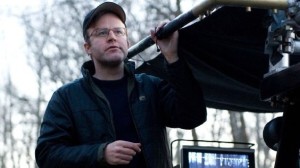
Director Thomas McCarthy on the set of “Win Win.” © 2011 – Fox Searchlight.
It’s a movie that’s “hard not to enjoy on some level.” That’s how director Thomas McCarthy describes his latest film, Win Win. After seeing it, it’s hard to disagree with that statement. This writer is in full agreement. Win Win tells the story of a struggling small town lawyer and moonlighting high school wrestling coach, Mike Flaherty (played by Paul Giamatti), who stumbles upon a runaway teen who just happens to be a star wrestler and turns Flaherty’s pathetic team around. This gifted athlete does not come into Flaherty’s life free of drama, however, and Giamatti’s character and his family can’t help but become invested in the teen’s uncertain future.
Last week, along with Kurt Anthony Krew of Patch.com, I had the distinct pleasure of interviewing Mr. McCarthy who proved to be every bit as likeable as his film. We’re sitting in chairs in the hotel suite at the Townsend Hotel in downtown Birmingham, Michigan and we’ve been informed that this is the last stop on McCarthy’s multi-city press tour. In walks McCarthy with Mary Jane Skalski, Michigan native and producer of the film. The two are no doubt just like family at this point as Win Win is the third film that McCarthy and Skalski have worked on together. The first two being McCarthy’s The Station Agent (2003) and The Visitor (2008). McCarthy removes his baseball cap and introduces himself. He sits comfortably on the couch across from us and attentively awaits our questions….
**********
Patch.com: Really enjoyed Win Win. This is your last city.
Tom McCarthy: This is my last city. How do you know that?
Patch.com: A little birdie told me.
McCarthy: Did they say I might be cranky or something? (Laughs)
CinemaNerdz: Oh no. They said you were wonderful. And I believe them.
Patch.com: I believe them too.
CinemaNerdz: Your movie is fantastic. You have got to be proud of it.
McCarthy: I am. You’re right this is my last city, been doing this for a couple weeks or so. You do the grind because you need to. Literally you almost have to go door to door and sell movies like this to get the word of mouth out there. But it’s a lot easier when audiences are really responding to the movie. And it [Win Win] also has gotten some critical support which is also very nice as a filmmaker; more encouraging. The good part about going city to city is I literally every night sit in an audience, and it’s a really good thing to see how they respond and how they react and their comments after. It is probably one of the more gratifying parts of this part of the process.
CinemaNerdz: You’ve got to feel somewhat vulnerable to have your work out there and people judging you. I mean you do a great job with it.
McCarthy: Yeah the first time you screen it is rough. Once you know the film is working and you can tell someone with confidence. “See it. I think you’ll enjoy it” there is a pretty good chance that they will. There’s always that chance that they see it and it might not be their thing, but it’s a hard movie not to enjoy on some level. You’ve got to really work not to enjoy it. Pick a performance, you might not like the movie, but you might like Amy Ryan or Paul [Giamatti], or might just like the kid. You might like wrestling. I don’t know. But it is a very vulnerable place to be in; especially the first five or six times you screen your movie, but it’s part of the business. The most random person on the street can say something like “I thought it was slow,” and then you’re like “Argghhh.” You take it all in. It’s not like we wear armor or anything. Anyone can get to you if you let it. There’s got to be a certain point where I think I’ve gotten use to that as an actor, you take so many shots in your career. That is a brutal career.
Patch.com: I got to ask you, this is like a three part question. Do you prefer writing and directing over acting and how did you transition into directing? That’s parts 1 & 2.
McCarthy: Is there a third part? Hold on, I’ll do one and two. I’ll definitely forget three if you tell me right now. For 1 & 2, I don’t prefer one over the other. I really enjoy doing all three. I rarely do all three at the same time. Sometimes when I’m acting, I’m also writing. Writing and directing obviously go hand in hand. When I am directing everything else kind of goes away. You don’t have the time or capacity to do anything else.
Patch.com: How did you end up transitioning into directing?
McCarthy: Well, when I was first out of drama school, that’s where I met Paul actually. I was out of school and had been acting for three or four or five years and I transitioned into television and then film, and I was doing a bunch of independent films and I just felt like I wanted to write one. It was that simple. It felt that a lot of what I was acting, especially in the indie world, wasn’t indicative of the type of movies I wanted to be a part of, and I thought that just meant as an actor. But I started writing I got really involved and I really began to see the movie, and I thought “what if I were to direct it, what’s the worst thing that could happen?” I honestly approached it as just an experiment really. I didn’t have a grand ambition at that point to be a film director. A lot of guys do, or they know they want to do it. I was just so happy at that point to be taken seriously as an actor that I felt fortunate, and then after The Station Agent my career changed. It gave me a lot more opportunities as a writer and director. Part 3 …
Patch.com: Part 3, now you’ve worked with many talented directors, Clint Eastwood for one, have they influenced you or inspired you as a director in any way?
McCarthy: Sure, every one of them in some way. It’s hard to quantify. I’d have to innately sit down and write some list about everything that I’ve learned from each director. It’s a great advantage to be a writer/director/actor, because you are working with a bunch of different types of directors, some first-timers or those like Peter Jackson, or Clint [Eastwood] all different types of personalities picking up and learning from them. Sometimes that means is what they do that works and what they do that doesn’t work for you. It’s hard not to bring that back to your work.
CinemaNerdz: Let’s talk about Win Win. I saw that you co-created the story, and of course you wrote and directed it. Can you briefly tell us how it got from just a story idea into this great film?
McCarthy: Joe [Tiboni] and I spent six months just talking, talking, and talking. That’s usually what I do. I sort of get an idea, and I just talk about it a lot to someone or two people or anyone that comes around and will listen to me. In this case it was a lot of fun because I got to spend a lot of time with Joe. He’s a good friend of mine. We literally just took notes and outlined and pieced the story together. It’s a typical process for me where I collect ideas. I think “what if it was wrestling, and in Providence, and what if he was a small town lawyer?” You sort of put all of the ideas together and how it should go. It’s almost hard for me to go back and recount how the idea evolved. I do remember that wrestling was the first idea I had. The rest was just bits and pieces till I felt that I had enough to put together and outline and then start writing.
CinemaNerdz: How much casting do you do? These actors really brought your characters to life. Did you write a part having Paul Giamatti in mind?
McCarthy: I do. I had Paul in mind, I had Amy in mind from the very beginning I had Bobby [Cannavale] in mind. And just about everyone else I had to go out and find. But I had those three in mind for sure.
CinemaNerdz: So you kind of wrote the characters for them … does it help you with your story?
McCarthy: Sometimes it helps, because you hear a voice in your writing. And you start thinking what that voice will bring to the role, how they would fill the role out. Ultimately writing is writing, whatever trick you use to get inside a character you still have to write 5, 6, 8 characters with distinct voices and points of views, and histories and needs and all those things that drive a character. It does help a lot for me. But sometimes you write a character for a person and you can’t get that actor. So, that character is still there. Even when I write for these [specific] guys, I had Amy Ryan in the room for rehearsal, and after hearing her voice, I had to tweak her.
CinemaNerdz: She is fantastic too. Your whole cast is.
McCarthy: Yeah, good group.
Patch.com: What were some of the challenges you faced when you were making this movie?
McCarthy: I think our biggest challenge was pre-production. It was brutal. We got started late, we didn’t have an end date, and we got pushed back because of weather conditions. I didn’t want to start filming no later than March 13th [2010], so pre-production was shortened as a result. It was 8 weeks or 6 weeks and I had this really great production crew who was working brutally long hours, I mean 18-20 hours, and you see people working that hard for the film and it sort of fires you up to work harder, but they did a great job. Once we go into production, things are always going to go wrong, but I thought by in large, it went smoothly and we had a lot of fun. You can tell when there’s a good vibe on the set. Things were running smoothly and when things run smoothly people loosen up and do their best work.
CinemaNerdz: One of the reasons that I like this film is that it is very relatable. How relatable is it for you?
McCarthy: Very. I was just talking to a New Jersey paper and I am from New Jersey and it feels like home to me. I do feel like I know these people. Now we’ve gone everywhere across the country and every city we’ve gone to from Austin to Seattle, from Minneapolis to San Diego, we’ve gotten that response and I think it’s because Joe and I did our job of creating something very specific and personal to us. I think as a writer when you do that, people see themselves in these characters and I think it comes down to empathy for these characters. They see a guy struggling, we are all struggling, and I think because we do it with a light comedic touch they don’t feel like they’re being preached to. They feel like they are living with these characters for a while and that’s our job.
CinemaNerdz: You really root for them. You want to see them succeed.
McCarthy: Exactly.
Patch.com: If I may, Mary Jane can I get a question out of you? How did you get involved with this movie?
Mary Jane Skalski: Well, I worked with Tom on The Station Agent and The Visitor and I had a pull position for this one. It was really just a question of will we work together as opposed to finding the script and trying to meet him.
Patch.com: Anything else you can add about this movie?
Skalski: I really love it. I think of the three movies that we did together. This one is so easy to love.
McCarthy: It’s the third child. It’s not causing any trouble, just happy to be part of the family.
**********
See Tom McCarthy’s third child Win Win, opening on April 1st, 2011!

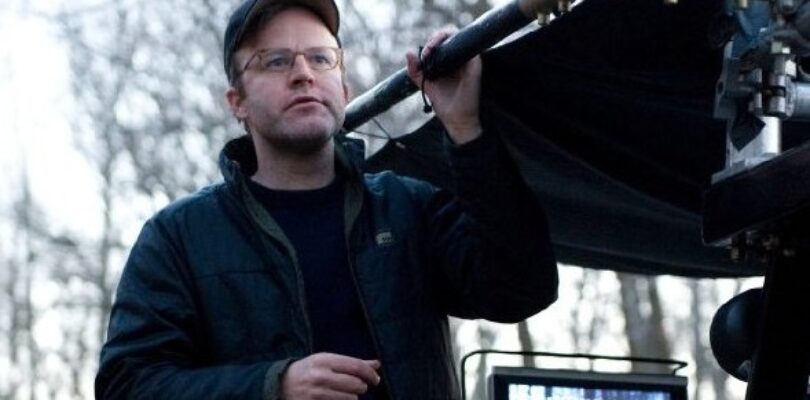
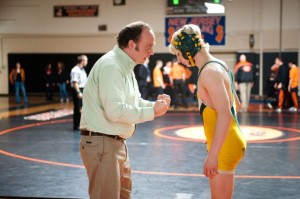
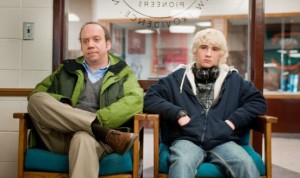
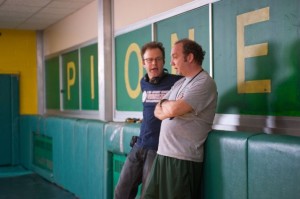

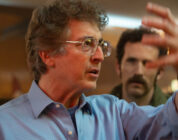
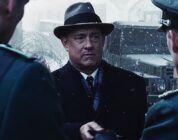

ZungPoo
Seems like a pretty cool dude to me. Wow.